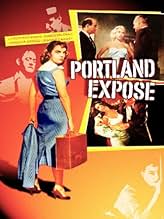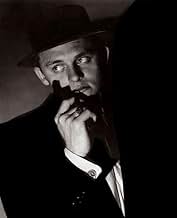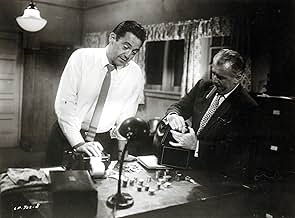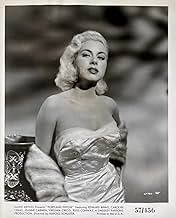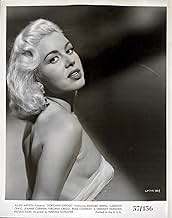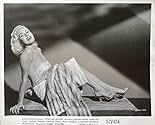A tavern owner in mid-century Portland, Oregon finds the safety of himself and his family threatened when he becomes involved in a war between labor unions and a violent local crime syndicat... Read allA tavern owner in mid-century Portland, Oregon finds the safety of himself and his family threatened when he becomes involved in a war between labor unions and a violent local crime syndicate.A tavern owner in mid-century Portland, Oregon finds the safety of himself and his family threatened when he becomes involved in a war between labor unions and a violent local crime syndicate.
Lawrence Dobkin
- Garnell
- (as Larry Dobkin)
Joseph Marr
- Larry
- (as Joe Marr)
Richard Bellis
- Jimmy Madison
- (as Dickie Bellis)
John Alban
- Tavern Patron
- (uncredited)
Albert Cavens
- Tavern Patron
- (uncredited)
Beulah Christian
- Tavern Patron
- (uncredited)
Francis De Sales
- Alfred Grey
- (uncredited)
Kort Falkenberg
- Speed Bromley
- (uncredited)
Stanley Farrar
- Spud Lennox
- (uncredited)
- Director
- Writer
- All cast & crew
- Production, box office & more at IMDbPro
Featured reviews
Based on a "True Story" the opening scene features a panoramic view of Portland as the narration extols
the beauty, culture and incredible atmosphere of the city as a wonderful place to raise a family.
Sounds like Paradise but...it seems the town has been overran by murderous rival crime syndicates vying
for control of the lucrative pinball vending business.
Filmed in a semi-documentary style, Portland Expose reveals the sordid, corrupt side of the City of Roses. The movie follows the plight of local barkeeper George Madison (Edward Binns) as he becomes entangled with the criminal underworld after he agrees to have a pinball machine placed in his tavern. Soon the syndicate forces him to place even more machines and his formerly quiet pub becomes a hangout for the 'wrong crowd'. Regretting his decision Madison decides to fight back after his daughter (Carolyn Craig) is attacked in the parking lot by a syndicate thug (Frank Gorshin). With the cooperation of local officials Madison decides to go undercover to gather evidence to expose the rackets.
The movie draws inspiration from the detective exploitation magazines of the era that promised behind the scenes sordid details. The stories were usually presented in a lascivious manner to maximize sensationalism as they followed the crime investigation through the eyes of the investigators. Tame by today's standards, the film pushed the boundaries into the acceptable content of the time. Though it's a fairly typical 1950's matinee programmer, Portland Exposé weaves a pretty fair noirish tale. Gritty and not highly stylized, it features ensemble cast composed of prolific career character actors (Binns, Virginia Gregg, Russ Conway, Lawrence Dobkin, Frank Gorshin, Rusty Lane, Joe Flynn) who manage to make the movie better than might be expected. All in all a watchable B crime flick.
Filmed in a semi-documentary style, Portland Expose reveals the sordid, corrupt side of the City of Roses. The movie follows the plight of local barkeeper George Madison (Edward Binns) as he becomes entangled with the criminal underworld after he agrees to have a pinball machine placed in his tavern. Soon the syndicate forces him to place even more machines and his formerly quiet pub becomes a hangout for the 'wrong crowd'. Regretting his decision Madison decides to fight back after his daughter (Carolyn Craig) is attacked in the parking lot by a syndicate thug (Frank Gorshin). With the cooperation of local officials Madison decides to go undercover to gather evidence to expose the rackets.
The movie draws inspiration from the detective exploitation magazines of the era that promised behind the scenes sordid details. The stories were usually presented in a lascivious manner to maximize sensationalism as they followed the crime investigation through the eyes of the investigators. Tame by today's standards, the film pushed the boundaries into the acceptable content of the time. Though it's a fairly typical 1950's matinee programmer, Portland Exposé weaves a pretty fair noirish tale. Gritty and not highly stylized, it features ensemble cast composed of prolific career character actors (Binns, Virginia Gregg, Russ Conway, Lawrence Dobkin, Frank Gorshin, Rusty Lane, Joe Flynn) who manage to make the movie better than might be expected. All in all a watchable B crime flick.
Portland Express (1957)
Overall, this is often a stilted affair, and it begins and ends with a canned voice-over about Portland, the Oregon city at the center of this unlikely crime scenario. And for people looking for noir, this is not noir at all, though it does have a kind of throwback to some gangster thugs, and there is a good twenty minutes of night stuff that has a noir look.
Portland Express is more about American innocence, and the surprise anachronism of these mobsters in fedoras pressuring a cute roadhouse into using their pinball machines. Which leads to bigger pressures.
The lead man is a small time movie and later t.v. character, Edward Binns, a solid but unexciting actor, sort of perfect for this solid but unexciting town (back then--now I hear it's solid and exciting). And his daughter is a complete unknown who acts her heart out, and really feels like a teenager on the cusp of womanhood in a realistic way. This matters because she becomes central to the plot, including in a harrowing and almost abusive rape scene (it pushes the violence very hard for a movie of this simplicity). But it's a turning point for Binns, the father, and for the plot, as this likable, ordinary family man goes undercover to get the bad guys.
Naturally, we root for him, and see the dismantling of the syndicate. It gets increasingly dark and desperate over time, and a bit unlikely, but you'll still want to watch to the end, when the cavalry arrives--a group of ordinary men in plaid shirts who rush in to save the day. It's not as hilarious as it sounds. There is a quality of really beautiful, ordinary middle-America here that resonates, and that helps show this is really a 1950s movie. It's widescreen black and white, and a genuine slice of its period.
Overall, this is often a stilted affair, and it begins and ends with a canned voice-over about Portland, the Oregon city at the center of this unlikely crime scenario. And for people looking for noir, this is not noir at all, though it does have a kind of throwback to some gangster thugs, and there is a good twenty minutes of night stuff that has a noir look.
Portland Express is more about American innocence, and the surprise anachronism of these mobsters in fedoras pressuring a cute roadhouse into using their pinball machines. Which leads to bigger pressures.
The lead man is a small time movie and later t.v. character, Edward Binns, a solid but unexciting actor, sort of perfect for this solid but unexciting town (back then--now I hear it's solid and exciting). And his daughter is a complete unknown who acts her heart out, and really feels like a teenager on the cusp of womanhood in a realistic way. This matters because she becomes central to the plot, including in a harrowing and almost abusive rape scene (it pushes the violence very hard for a movie of this simplicity). But it's a turning point for Binns, the father, and for the plot, as this likable, ordinary family man goes undercover to get the bad guys.
Naturally, we root for him, and see the dismantling of the syndicate. It gets increasingly dark and desperate over time, and a bit unlikely, but you'll still want to watch to the end, when the cavalry arrives--a group of ordinary men in plaid shirts who rush in to save the day. It's not as hilarious as it sounds. There is a quality of really beautiful, ordinary middle-America here that resonates, and that helps show this is really a 1950s movie. It's widescreen black and white, and a genuine slice of its period.
Edward Binns stars in this B movie about a tavern owner in Portland who is offered a jukebox, a pinball machine, and a slot machine to install.
However, a tough syndicate takes over the area and begins controlling the business, turning it into a hard-core gambling establishment that includes B girls.
At first, family man George Madison goes along after his family is threatened. However, one night, a thug that likes jail bait (Frank Gorshin) nearly rapes his daughter (Carolyn Craig). Madison sends his family away and agrees to go undercover, wearing a wire.
Nothing special, the underdog against a crime syndicate. However, it does show a wholesome American '50s family up against the sleazeballs. It's also fairly gritty.
The story is based on Portland crime boss Big Jim Elkins.
Jeanne Carmen, purportedly a close confidant of Marilyn Monroe, does a terrific job as the B girl who exposes Madison as undercover. Carmen claimed knowledge of Monroe and the Kennedys.
After the death of Monroe, Jimmy Rosselli, who worked for Sam Giancana, told get to leave Hollywood as her life was in danger. She lived incognito for over a decade. However, her stories have been questioned and denied by those who knew Monroe.
However, a tough syndicate takes over the area and begins controlling the business, turning it into a hard-core gambling establishment that includes B girls.
At first, family man George Madison goes along after his family is threatened. However, one night, a thug that likes jail bait (Frank Gorshin) nearly rapes his daughter (Carolyn Craig). Madison sends his family away and agrees to go undercover, wearing a wire.
Nothing special, the underdog against a crime syndicate. However, it does show a wholesome American '50s family up against the sleazeballs. It's also fairly gritty.
The story is based on Portland crime boss Big Jim Elkins.
Jeanne Carmen, purportedly a close confidant of Marilyn Monroe, does a terrific job as the B girl who exposes Madison as undercover. Carmen claimed knowledge of Monroe and the Kennedys.
After the death of Monroe, Jimmy Rosselli, who worked for Sam Giancana, told get to leave Hollywood as her life was in danger. She lived incognito for over a decade. However, her stories have been questioned and denied by those who knew Monroe.
This film begins with a rather unnecessary and stuffy prologue. Fortunately, despite this weak introduction, the film turns out to be a very, very tough film indeed--with thugs who are child molesters or threaten to throw acid in people's faces. This is NOT your typical 1950s Film Noir movie, but a hard as nails look at organized crime in a rather unexpected locale--Portland, Oregon.
You'll probably notice Virginia Gregg in the female lead. She was seen in 1001 "Dragnet" episodes. Edward Binns, a fine character actor whose name you probably won't recognize plays Gregg's husband--a man who is being forced by the local mob to play ball. Frank Gorshin, in a small but memorable role, plays the rapist who is so vile even the gang is disgusted by him.
As for the plot, it's a very familiar one--having been seen in such earlier films as LOAN SHARK and APPOINTMENT WITH DANGER. An honest guy is sick of the mob, so he agrees to join them in order to get evidence to prosecute them. In this case, Binns pretends to be a rather worldly and not too honest man who is interested in moving up in the organization. However, despite being familiar, the film is handled well and is more than just another time-passer.
You'll probably notice Virginia Gregg in the female lead. She was seen in 1001 "Dragnet" episodes. Edward Binns, a fine character actor whose name you probably won't recognize plays Gregg's husband--a man who is being forced by the local mob to play ball. Frank Gorshin, in a small but memorable role, plays the rapist who is so vile even the gang is disgusted by him.
As for the plot, it's a very familiar one--having been seen in such earlier films as LOAN SHARK and APPOINTMENT WITH DANGER. An honest guy is sick of the mob, so he agrees to join them in order to get evidence to prosecute them. In this case, Binns pretends to be a rather worldly and not too honest man who is interested in moving up in the organization. However, despite being familiar, the film is handled well and is more than just another time-passer.
A tavern owner helps authorities get the goods on gangs trying to take over a labor union.
This Lindsley Parsons production is one of the many "confidential" or "expose" films of the time. Usually the tabloid title would include the name of a city whose supposed racketeers the movie would then expose. This movie appears inspired by the acid blinding of New York City labor reporter Victor Riesel in 1956 for his investigations into labor racketeering in that city.
The low-budget Parsons outfit may have produced this programmer, but they managed two key assets, despite the lowly origins. First, they got heavyweight actor Ed Binns for the lead, along with familiar face Virginia Gregg and that fine little actress Carolyn Craig. What Binns lacks in marquee value, he makes up for in sheer talent, having been one of the Twelve Angry Men (1957) in that powerhouse film of the same year.
Second, the movie did extensive location filming in Portland, lending the visuals both interest and a realistic air. The woodsy tavern, in particular, looks genuine instead of the usual Hollywood fakery. Then too, the screenplay manages some suspense, especially when Madison (Binns) goes undercover. But the highlight may be hoodlum Joe's (Gorshin) attempted rape of sweet little Ruth (Craig). It's pretty explicit for the time.
If there's a downside, in my book, it's the absence of real menace from any of the bad guys (contrast with the subtle menace of kingpin Edward Andrews' in Phenix City Story {1955}). All in all, however, the movie manages a number of interesting features without being anything special.
(In passing—Catch sexpot Jeanne Carmen (Iris) who was Marilyn Monroe's "bosom buddy" in more obvious ways than one. Also, such a shame that Carolyn Craig died so young and under rather mysterious circumstances, as well.)
This Lindsley Parsons production is one of the many "confidential" or "expose" films of the time. Usually the tabloid title would include the name of a city whose supposed racketeers the movie would then expose. This movie appears inspired by the acid blinding of New York City labor reporter Victor Riesel in 1956 for his investigations into labor racketeering in that city.
The low-budget Parsons outfit may have produced this programmer, but they managed two key assets, despite the lowly origins. First, they got heavyweight actor Ed Binns for the lead, along with familiar face Virginia Gregg and that fine little actress Carolyn Craig. What Binns lacks in marquee value, he makes up for in sheer talent, having been one of the Twelve Angry Men (1957) in that powerhouse film of the same year.
Second, the movie did extensive location filming in Portland, lending the visuals both interest and a realistic air. The woodsy tavern, in particular, looks genuine instead of the usual Hollywood fakery. Then too, the screenplay manages some suspense, especially when Madison (Binns) goes undercover. But the highlight may be hoodlum Joe's (Gorshin) attempted rape of sweet little Ruth (Craig). It's pretty explicit for the time.
If there's a downside, in my book, it's the absence of real menace from any of the bad guys (contrast with the subtle menace of kingpin Edward Andrews' in Phenix City Story {1955}). All in all, however, the movie manages a number of interesting features without being anything special.
(In passing—Catch sexpot Jeanne Carmen (Iris) who was Marilyn Monroe's "bosom buddy" in more obvious ways than one. Also, such a shame that Carolyn Craig died so young and under rather mysterious circumstances, as well.)
Did you know
- TriviaFinal film of Lea Penman.
- ConnectionsFeatured in WatchMojo: Top 10 Movies Banned ONLY in America (2022)
- How long is Portland Exposé?Powered by Alexa
Details
- Release date
- Country of origin
- Official sites
- Language
- Also known as
- Portland Expose
- Filming locations
- Production company
- See more company credits at IMDbPro
- Runtime
- 1h 12m(72 min)
- Color
- Aspect ratio
- 1.85 : 1
Contribute to this page
Suggest an edit or add missing content


